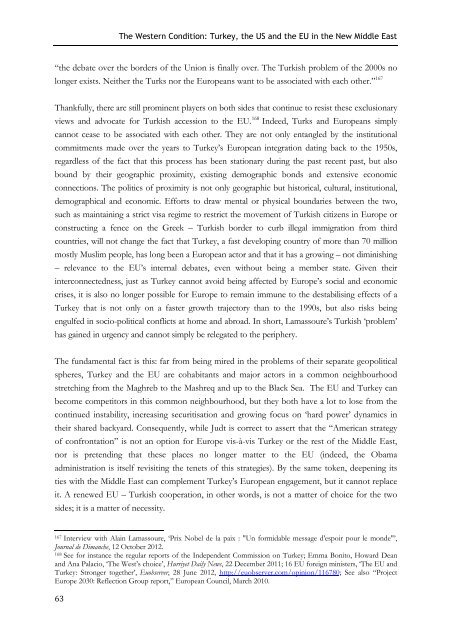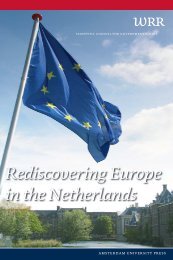The Western Condition - St Antony's College - University of Oxford
The Western Condition - St Antony's College - University of Oxford
The Western Condition - St Antony's College - University of Oxford
You also want an ePaper? Increase the reach of your titles
YUMPU automatically turns print PDFs into web optimized ePapers that Google loves.
<strong>The</strong> <strong>Western</strong> <strong>Condition</strong>: Turkey, the US and the EU in the New Middle East<br />
“the debate over the borders <strong>of</strong> the Union is finally over. <strong>The</strong> Turkish problem <strong>of</strong> the 2000s no<br />
longer exists. Neither the Turks nor the Europeans want to be associated with each other.” 167<br />
Thankfully, there are still prominent players on both sides that continue to resist these exclusionary<br />
views and advocate for Turkish accession to the EU. 168 Indeed, Turks and Europeans simply<br />
cannot cease to be associated with each other. <strong>The</strong>y are not only entangled by the institutional<br />
commitments made over the years to Turkey’s European integration dating back to the 1950s,<br />
regardless <strong>of</strong> the fact that this process has been stationary during the past recent past, but also<br />
bound by their geographic proximity, existing demographic bonds and extensive economic<br />
connections. <strong>The</strong> politics <strong>of</strong> proximity is not only geographic but historical, cultural, institutional,<br />
demographical and economic. Efforts to draw mental or physical boundaries between the two,<br />
such as maintaining a strict visa regime to restrict the movement <strong>of</strong> Turkish citizens in Europe or<br />
constructing a fence on the Greek – Turkish border to curb illegal immigration from third<br />
countries, will not change the fact that Turkey, a fast developing country <strong>of</strong> more than 70 million<br />
mostly Muslim people, has long been a European actor and that it has a growing – not diminishing<br />
– relevance to the EU’s internal debates, even without being a member state. Given their<br />
interconnectedness, just as Turkey cannot avoid being affected by Europe’s social and economic<br />
crises, it is also no longer possible for Europe to remain immune to the destabilising effects <strong>of</strong> a<br />
Turkey that is not only on a faster growth trajectory than to the 1990s, but also risks being<br />
engulfed in socio-political conflicts at home and abroad. In short, Lamassoure’s Turkish ‘problem’<br />
has gained in urgency and cannot simply be relegated to the periphery.<br />
<strong>The</strong> fundamental fact is this: far from being mired in the problems <strong>of</strong> their separate geopolitical<br />
spheres, Turkey and the EU are cohabitants and major actors in a common neighbourhood<br />
stretching from the Maghreb to the Mashreq and up to the Black Sea. <strong>The</strong> EU and Turkey can<br />
become competitors in this common neighbourhood, but they both have a lot to lose from the<br />
continued instability, increasing securitisation and growing focus on ‘hard power’ dynamics in<br />
their shared backyard. Consequently, while Judt is correct to assert that the “American strategy<br />
<strong>of</strong> confrontation” is not an option for Europe vis-à-vis Turkey or the rest <strong>of</strong> the Middle East,<br />
nor is pretending that these places no longer matter to the EU (indeed, the Obama<br />
administration is itself revisiting the tenets <strong>of</strong> this strategies). By the same token, deepening its<br />
ties with the Middle East can complement Turkey’s European engagement, but it cannot replace<br />
it. A renewed EU – Turkish cooperation, in other words, is not a matter <strong>of</strong> choice for the two<br />
sides; it is a matter <strong>of</strong> necessity.<br />
167 Interview with Alain Lamassoure, ‘Prix Nobel de la paix : "Un formidable message d'espoir pour le monde"’,<br />
Journal de Dimanche, 12 October 2012.<br />
168 See for instance the regular reports <strong>of</strong> the Independent Commission on Turkey; Emma Bonito, Howard Dean<br />
and Ana Palacio, ‘<strong>The</strong> West’s choice’, Hurriyet Daily News, 22 December 2011; 16 EU foreign ministers, ‘<strong>The</strong> EU and<br />
Turkey: <strong>St</strong>ronger together’, Euobserver, 28 June 2012, http://euobserver.com/opinion/116780; See also “Project<br />
Europe 2030: Reflection Group report,” European Council, March 2010.<br />
63

















